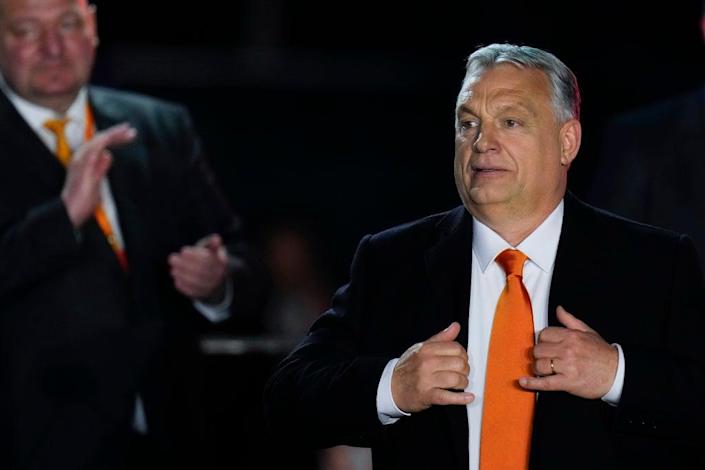
Hungary’s prime minister said he asked Russian President Vladimir Putin on Wednesday to call an immediate cease-fire in the war in Ukraine and that his country will comply with Russian demands to pay for natural gas imports in rubles.
Prime Minister Viktor Orban said he spoke with Putin by phone and urged the Russian leader to end the military conflict in neighboring Ukraine. Orban said he also offered to host a conference in Hungary’s capital between the warring parties.
“I suggested that (Putin) … the Ukrainian president, the French president and the German chancellor hold a meeting here in Budapest, the sooner the better,” Orban said. “It should not be a peace negotiation and not a peace settlement, because that takes longer, but an immediate cease-fire agreement.”
Orban spoke at a news conference days after his Fidesz party won a fourth consecutive term leading the Hungarian government. Hungary is a member of both the European Union and NATO.
The right-wing nationalist leader, who is considered Putin’s closest ally in the EU, has vehemently refused to supply weapons to Ukraine or allow their transport across the Hungary-Ukraine border. He also lobbied heavily against the EU imposing sanctions on Russian energy imports.
On Wednesday, Orban said his government would comply with Moscow’s demand that “unfriendly countries” pay for Russian gas imports in Russian rubles, a condition that some Western leaders have rejected.
“We have no difficulty paying in rubles, so if the Russians ask for it, we will pay in rubles,” he said, adding that Hungary would “not give in to any pressure to extend sanctions against Russia to gas and oil. That would kill the Hungarian economy.”
Orban sought to play down concerns among some of his critics that he had formed too close a relationship with Putin while acting to impede a united EU response to the Russian invasion. The Hungarian leader spoke with new clarity on Russia being the aggressor in the war.
He said that all reports of atrocities coming out of areas where Russian forces have withdrawn, such as in the Kyiv suburb of Bucha, should be examined through “independent and impartial investigation.”
“Civilians must be protected at all costs. Ill-treatment of civilians must be condemned in the strongest possible terms, and such cases must be investigated,” Orban said.
Since taking office in 2010, Orban has overseen the burgeoning of diplomatic and economic cooperation with Moscow, and his government has increased Hungary’s dependence on Russian fossil fuels.
Yet the war in Ukraine has changed the dynamics between the two countries as Hungary has sought to fulfill its obligations to its Western allies while trying to maintain the flow of Russian gas.
“(The Russians) know what I know: that we have built a well-functioning relationship system that is being broken down right now,” Orban said. “I am trying to save something from this that could survive this period. But it could easily be that the sanctions and the pressure from the West will be so strong that nothing will be left of it.”




